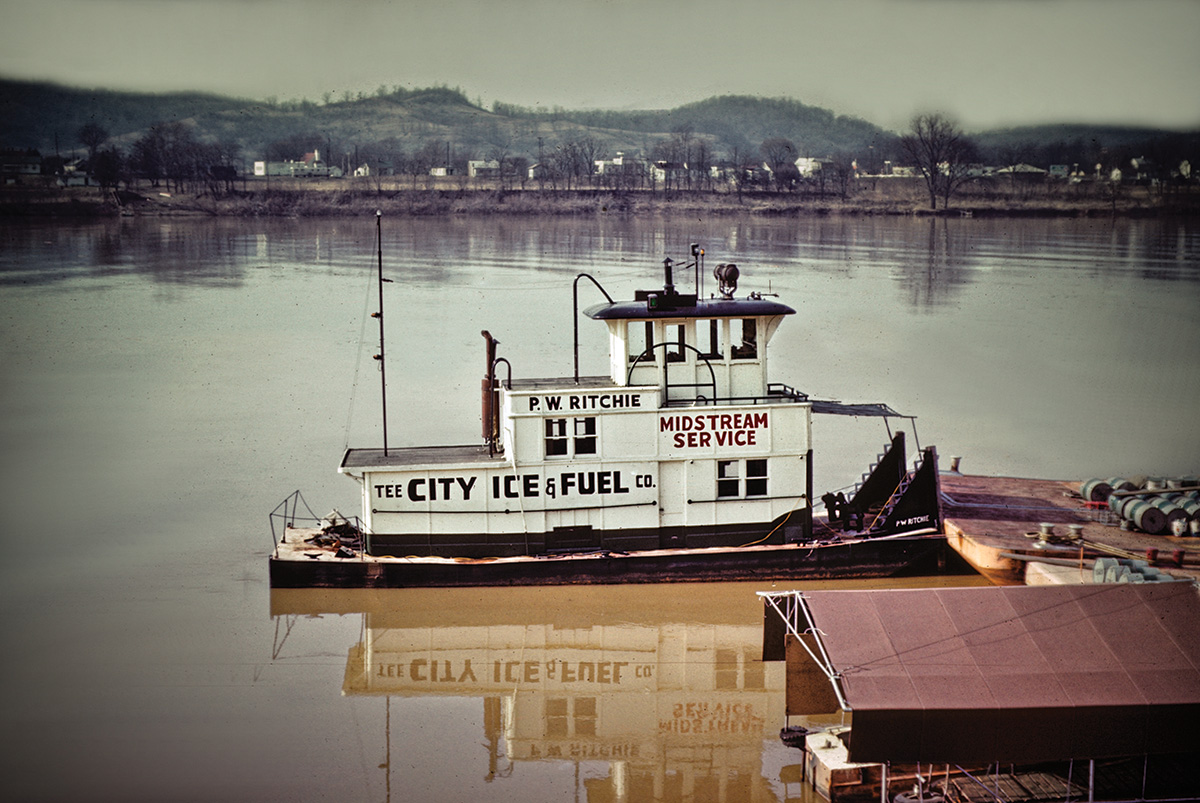The Howards of Jeffersonville, Ind., were known for the beautiful wooden packets they started building in 1834. By the turn of the century, they had created some of the most graceful and opulent boats that ever existed on the Mississippi River system. Along with these, the concern also built many simple, sturdy craft that served their owners well. The Howards later built equally proficient towboats that performed very well.
By the end of the first quarter of the 20th century, the Howard yard was turning out more barges, work flats and motorboats than towboats. The age of the packet was basically over, and hulls were now constructed of steel rather than wood. The last large towboat built there was the sternwheel steamer Mark Twain for the Inland Waterways Corporation (Federal), which entered service in February 1932. Due to many factors, the yard had fewer orders going forward.
Only one towboat was built at the Howard yard in 1939. Compared to some of the colossal packets built in days gone by, this boat, built for Two Rivers Barge Line of Cincinnati, Ohio, was diminutive and inconsequential. It was named Wm. B. Brokamp and had a steel hull that was 54 feet by 14 feet with a depth of 3.8 feet. Power for the single-screw boat was supplied by a direct reversing Fairbanks-Morse diesel engine of 120 hp.
Photos show that the cabin of the boat was of wood. Atop the main cabin was a pilothouse that appears large in relation to the boat. It had multi-paned windows on all four sides, a traditional pilot wheel in place for steering and a stovepipe that indicates a coal stove probably heated the space. A single smokestack behind the pilothouse rose to the roof of that structure. Any quarters aboard must have been minuscule at best.
According to the Inland River Record, the Brokamp was sold in February 1944 to Central Barge Company of Chicago. It may have been at this time or just before that the cabins were rebuilt. Author and former towboat pilot Richard Bissell was on the boat just after the purchase. Letters to his wife, written in late February 1944 as the boat departed Cincinnati and headed to Brownsville, Pa., are included in his “My Life On the Mississippi, or Why I Am Not Mark Twain.” He described the boat as having a bunkroom on the second deck with an “inside staircase to officers’ quarters and galley.” He also said “shower baths on this boat really work.”
Bissell remarked that the engine control in the pilothouse “is sheer murder,” saying in another letter that it “sticks, jams and you can’t throttle down to a real slow bell.” Bissell said the steering was “very hard” and wore him out. Central renamed the boat Royce Patton, and in July 1952 it was transferred to the Mississippi Valley Barge Line with the rest of the Central floating stock.
The Valley Line sold the boat in 1955 to Capt. John B. Ritchie of Paducah, Ky., who renamed it P.W. Ritchie. In 1957, it was sold to the City Ice & Fuel Company, Point Pleasant, W.Va. For the next 17 years it would be a fixture as it shuttled a fuel barge from the landing boat (known as K.W. Tom) to vessels working or passing through the area at the mouth of the Kanawha River. The call letters of the little boat were WF 9901, and few who passed through Point Pleasant would miss seeing her at work. In 1962 it was repowered with a 210 hp. GM 6-110 engine and 3:1 reduction.
In 1971, City Ice & Fuel (by then a subsidiary of Hartley Marine) had a new twin-screw boat built, and the Ritchie became a spare. In 1974, it was sold to Ashland Drydocking Company, Portsmouth, Ohio. At some point the wooden cabin was removed, and a simple steel cabin and pilothouse was added. In 1976, the Ritchie was sold to Valley Inc., Millwood, W.Va., and in 1991 the owner was Reserve Transportation Company, Racine, Ohio. In 1998, the owner was Shelly Materials Inc., of Racine, Ohio, and in March 2000 it was operated by SMI Maine Transportation of Racine.
The P.W. Ritchie was dismantled in 2012, and the hull of the boat was on a flat at Henderson, W.Va., for some time. There was talk of rebuilding it, but that never happened. Finally, it was scrapped. This was the next to last towboat built by the Howards, and the fact that the little hull lasted some 72 years is a testament to the workmanship of the builders.
————
Feature photo caption: As the P.W. Ritchie at Point Pleasant, W.Va., in 1961. (Photo by Fran Mullen)




